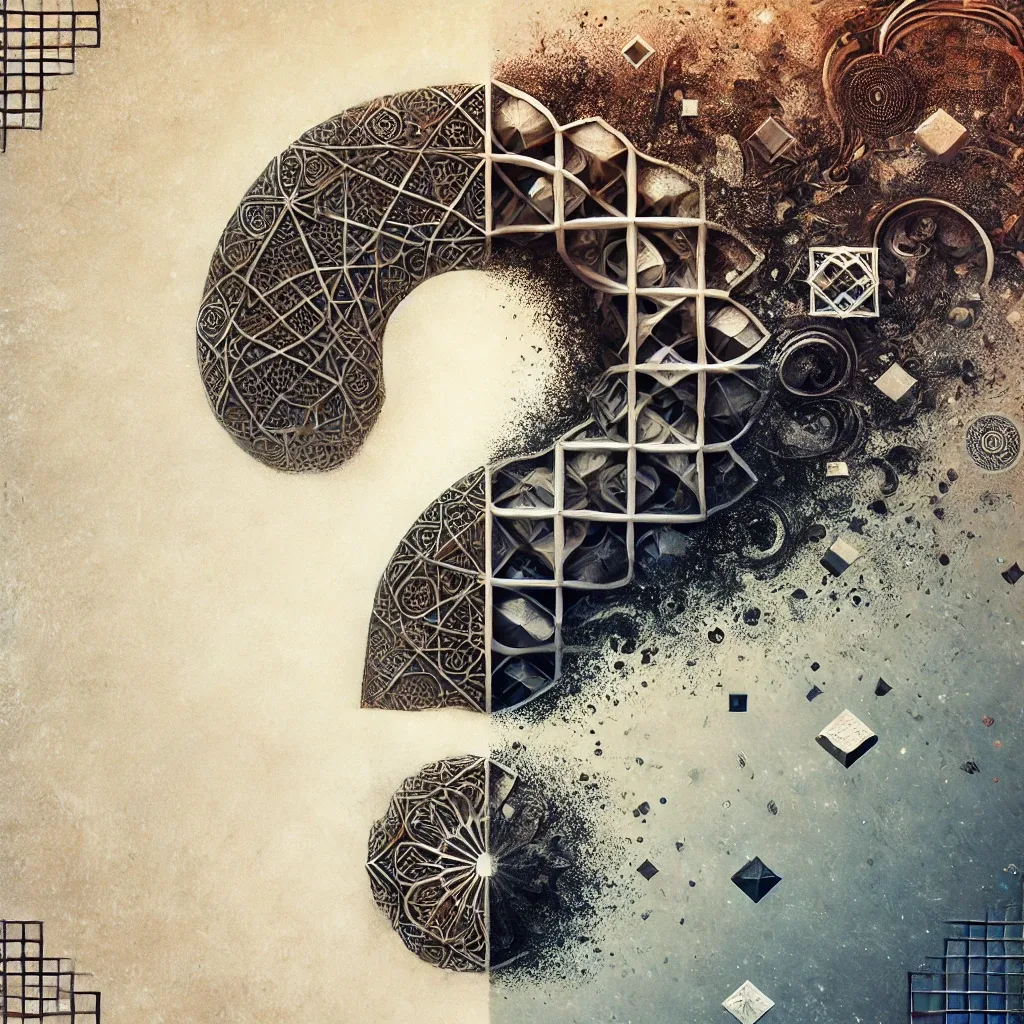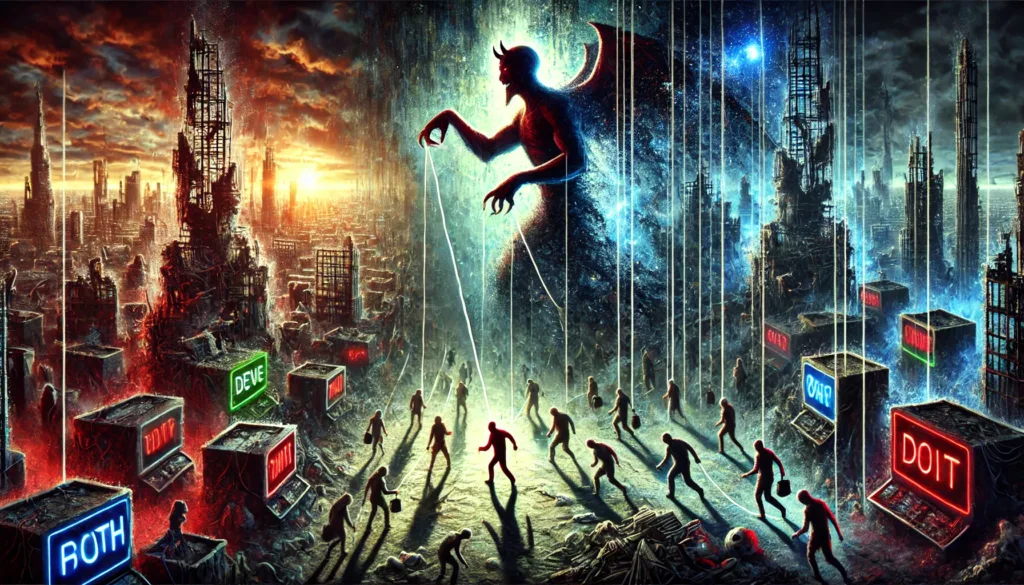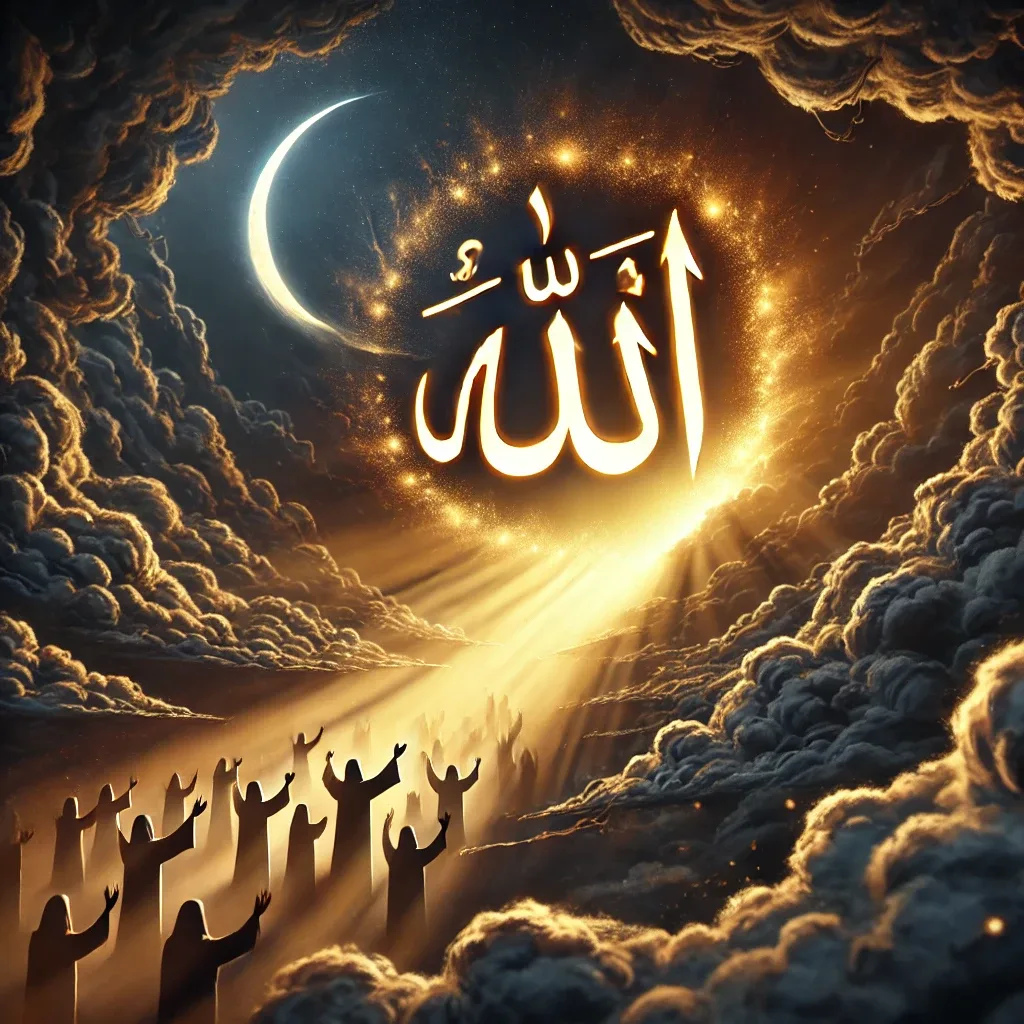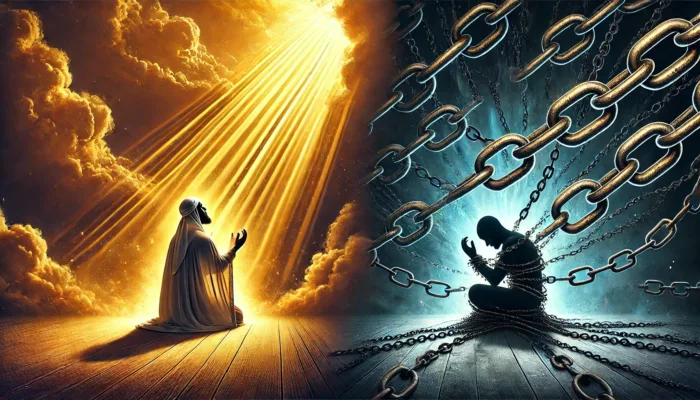Table of Contents
Introduction
This is the seventh article in the ‘Be Proud of Your Islam‘ series. It delves into the contrast between divine centrality in Islam and the focus on human centrality in modern secular ideologies. The article highlights that divine centrality, rooted in submission to ALLAH, serves as the ultimate safeguard for human dignity and well-being, whereas the emphasis on human centrality often leads to deviation and eventual loss. Click here to explore the full series.
Questioning the Paradigms: Divine Centrality vs Human Centrality
In our previous article, we explored how Islam is rooted in establishing Divine Centrality, while modern ignorance (Jahiliyyah) centers itself on Human Centrality. This comparison raises several important questions:
First: Does accepting Divine Centrality mean that humans will inevitably lose out? At first glance, it may seem like a duality—ALLAH or humans—as if embracing Divine Centrality requires sacrificing human dignity and interests. Meanwhile, advocates of Human Centrality might appear to champion human dignity by placing the self at the center. But is this perception accurate?

Second: Has Human Centrality truly succeeded in making humans central, or has it resulted in something entirely different?
Third: What are the values and standards that arise from Divine Centrality, and how do they compare to those emerging from Human Centrality?
Fourth: Could claiming Divine Centrality lead to humans oppressing one another in the name of religion? For example, when someone says, “I am obeying the Creator in my dealings with you, and the Creator commands me to treat you in such and such a way”, could this justify injustice? Would the solution, then, be to set religion aside in our interactions altogether?
Divine Centrality: The Path to True Human Interest
Let us address these questions in today’s article:
First: Does accepting that centrality belongs to the Creator mean that humans will lose? Not at all. By placing the Creator at the center, humans entrust the determination of their true interests to the One who knows them better than they do:
“Does HE who created not know, while HE is the Subtle, the Aware?“1
(Suraat ‘Al-Mulk, 67:14)
Humans ultimately benefit from following the commands of their Creator:
“…then whoever follows MY guidance will neither go astray [in the world] nor suffer [in the Hereafter]. And whoever turns away from My remembrance – indeed, he will have a depressed [i.e., difficult] life…”2
(Suraat Taaha, 20:123-124)
“Whoever is guided is only guided for [the benefit of] his soul. And whoever errs only errs against it…”3
(Suraat ‘Al-‘Israa’, 17:15)
“Whoever does righteousness – it is for his [own] soul; and whoever does evil [does so] against it…“4
(Suraat Fussilat, 41:46)
“Whoever disbelieves – upon him is [the consequence of] his disbelief. And whoever does righteousness – they are for themselves preparing“5
(Suraat ‘Ar-Ruum, 30:44)
“…And whoever purifies himself only purifies himself for [the benefit of] his soul...”6
(Suraat FaaTir, 35:18)
“…And whatever good you [believers] spend is for yourselves...”7
(Suraat ‘Al-Baqarah, 2:272)
On the other hand, ALLAH is entirely self-sufficient and in no need of creation:
“Indeed, ALLAH is Free from need of the worlds“8
(Suraat ‘Al-cankabuut, 29:6)
In a sacred hadith reported by Muslim, ALLAH declares:
“O MY servants, you will never be able to harm ME, nor will you be able to benefit ME“9
The benefit lies solely with humans.
The very first test in human history illustrates this principle. ALLAH commanded Adam and Eve not to eat from the tree—this was their obligation—and assured them of their needs:
“‘…Indeed, it is [promised] for you not to be hungry therein or be unclothed. And indeed, you will not be thirsty therein or be hot from the sun’. Then Satan whispered to him…“10
(Suraat Taaha, 20:118-120)
Yet Satan whispered to them. Through which door? He appealed to desires disconnected from ALLAH’s commands:
“he said, ‘O Adam, shall I direct you to the tree of eternity and possession that will not deteriorate?‘”11
(Suraat Taaha, 20:120)
The temptation was alluring: eternal life and an unending kingdom. But what was the result? They disobeyed ALLAH and gained neither what ALLAH had already guaranteed them through obedience nor what Satan falsely promised them. This incident serves as a profound lesson for all humanity until the Day of Judgment.
The Foundations of Justice: Divine Standards vs Human Metrics
What are the standards that emerge from Divine Centrality compared to those arising from Human Centrality?
Divine Centrality establishes the standards of truth and justice, as ALLAH declares:
“It is ALLAH who has sent down the Book in truth and [also] the balance [i.e., justice]“12
(Suraat ‘Ash-SHuuraa, 42:17)
Here, truth and balance symbolize justice. ALLAH further states:
“And with truth We have sent it down, and with truth it has descended,”
“And with the truth WE have sent it [i.e., the Qur’ān] down, and with the truth it has descended“13
(Suraat ‘Al-‘Israa’, 17:105)
and
“WE have already sent OUR messengers with clear evidences and sent down with them the Scripture and the balance that the people may maintain [their affairs] in justice“14
(Suraat ‘Al-Hadiid, 57:25)
These verses highlight how divine guidance organizes human relationships and ensures the fair distribution of rights and duties based on justice. Hence, in all divine legislation, one finds truth and justice, free from falsehood and oppression.
On the other hand, the followers of Human Centrality often avoid terms like “truth” and “falsehood” because these concepts inherently depend on divine revelation. For example, they do not claim: “We legalize adultery and homosexuality because this is the truth after we once saw it as false”, or “We prohibit polygamy because it is false”, or “We allow marijuana because we now believe it is the truth while we previously considered it false”. While they may claim to seek justice, their justice lacks a preserved divine standard. It becomes relative, flexible, and ever-changing, shaped by human diversity and shifting opinions rather than a fixed, divine foundation.
Divine Centrality also emphasizes the centrality of the Hereafter over worldly life, as ultimate justice is fully realized in the Hereafter:
“And WE place the scales of justice for the Day of Resurrection, so no soul will be treated unjustly at all“15
(Suraat ‘Al-‘Anbiyaa’, 21:47)
This perspective addresses the problem of evil that troubles many. Believers, recognizing ALLAH’s justice, find comfort in knowing that the suffering endured by the truthful and oppressed in this world is not overlooked. A single moment in Paradise will erase all their pain. Similarly, the centrality of the Hereafter helps believers accept the possibility of missing certain worldly desires, trusting that their commitment to Divine Centrality will result in eternal and unparalleled bliss in the Hereafter.
In contrast, Human Centrality dismisses divine truth and justice to prioritize human “freedom“. However, individual freedoms often conflict, leading to compromises disguised as equality. Consequently, modern ignorance elevates freedom and equality as the ultimate values, insisting they be the foundation of all legislation governing human societies.
The Illusion of Freedom: How Human Centrality Becomes Elite Control
This leads us to the next question: Has Human Centrality succeeded in truly making humans central?
At first glance, it seemed that Human Centrality placed humanity at the forefront, disconnecting people from revelation, its truth, and its justice. However, this detachment led humanity to become enslaved by desires and lusts. Even the values and morals they claim to uphold are not derived from submission to the Creator or acknowledgment of HIS centrality. Instead, they are selectively embraced, molded to fit a system of desires under the guise of “respecting other opinions“, no matter how misguided those opinions might be. ALLAH’s words aptly describe this condition:
“Have you seen the one who takes as his god his own desire? Then would you be responsible for him? Or do you think that most of them hear or reason? They are not except like livestock. Rather, they are [even] more astray in [their] way“16
(Suraat ‘Al-Furqaan, 25:43:44)
Consider the profound misguidance humanity has descended into after breaking away from Divine Centrality and succumbing to the deification of desires. The chaos in the realm of sexuality alone serves as a glaring example. ALLAH warns:
“Have you seen he who has taken as his god his [own] desire, and ALLAH has sent him astray due to knowledge…”17
(Suraat ‘Al-Jaathiyah, 45:23)
“Have you seen the one who takes his own desire as his god, and ALLAH has left him astray despite his knowledge?”
While humanity has reached extraordinary heights in the natural sciences, they have simultaneously fallen to the lowest depths of moral decay. This is the result of replacing the Creator’s guidance with the worship of desires, revealing the emptiness of Human Centrality’s promises.
Human beings differ in their understanding, thoughts, references, desires, and inclinations. When they abandon divine truth and justice, everything becomes subjective and relative, leading to inevitable conflicts of freedom. How can these conflicts be resolved? They cannot be completely prevented; rather, they must be managed by laws that favor some over others. However, laws inherently restrict freedoms. To reconcile these opposing forces—freedom and law—laws are often based on the desires of the majority.
But how is the majority opinion determined? Typically, through elected councils. What, then, influences the election of these councils? Media, capital, and lobbying groups, which control education and shape public opinion.
Thus, the concept of Human Centrality has shifted repeatedly: from the centrality of desires to the centrality of the majority, to the centrality of elected representatives, and finally to the centrality of those who control elections through media and capital. In the end, the individual who sought freedom becomes a captive to a small elite—those who control media and capital, driven only by their personal interests.

To understand this, one need only look at the disproportionate influence of a limited number of companies and individuals who control the media. The so-called “illusion of choice” becomes evident: media objectivity is a façade, and humans are presented with choices that serve the agendas of media directors while giving the impression of freedom.
For instance, homosexuals are granted the legal right to practice their acts, and court employees are penalized if they refuse to officiate their marriages. Critics of homosexuality who voice dissent are punished. A child, whose mind and natural disposition (fitrah) have been manipulated, is legally allowed to change their gender, while parents who attempt to protect them from this are criminalized.
Similarly, a state may claim the right to wage war on another nation, destroy its infrastructure, and plunder its resources, while punishing soldiers who refuse to comply. A woman may be granted the legal right to abort her fetus, infringing upon the fetus’s right to life. And legislative councils, such as those in France, may decide to close mosques or ban women from wearing the Hijab, with penalties imposed on anyone who resists these laws.
In contrast, consider the divine ruling of truth that remains unchanging, unaffected by the opinions of the majority, whether they are Muslims or others. Divine truth is not swayed by trends, desires, or societal pressures. It stands firm, providing a stable foundation for justice, morality, and human well-being. Consequently, the term “Human Centrality” is misleading. What truly occurs is the centrality of desires and lusts, often dominated by the ambitions and agendas of a specific group that imposes its will on others.
When observing the rapid moral, ethical, and humanitarian decline in the modern world, it becomes apparent that this is not a mere coincidence. It seems as though Satan himself is orchestrating the battle, inspiring his allies with relentless intensity:
“Devils among mankind and jinn, inspiring to one another.”
“…devils from mankind and jinn, inspiring to one another…”18
(Suraat ‘Al-‘Ancaam, 6:112)
For examples of this, consider the insights presented in the article “Muslim Responsibility Towards Humanity: A Wake-Up Call“. The reality of modern ignorance is that it has forsaken truth, justice, freedom, and equality—not only the divine standards but also the very principles it claims to uphold.
Satan’s Victory: The Final Destination of Human Autonomy
The matter ultimately ends with centrality becoming Satan’s:
“Did I not enjoin upon you, O children of Adam, that you not worship Satan – [for] indeed, he is to you a clear enemy – And that you worship [only] ME? This is a straight path. And he had already led astray from among you much of creation, so did you not use reason?“19
(Suraat Yaasiin, 36:60-62)
Did you not use reason? How can one abandon the honor derived from servitude to ALLAH and instead degrade themselves through servitude to Satan?
“…And he whom ALLAH humiliates – for him there is no bestower of honor“20
(Suraat ‘Al-Hajj, 22:18)
Satan, who arrogantly said of Adam:
“…'”Do YOU see this one whom YOU have honored above me? If YOU delay me [i.e., my death] until the Day of Resurrection, I will surely destroy his descendants, except for a few’“21
(Suraat ‘Al-‘Israa’, 17:62)
Satan vowed to place humanity under his control, likening it to a bridle placed in an animal’s mouth, steering them as he pleases. ALLAH confirms this in HIS words
“And Iblees had already confirmed through them his assumption, so they followed him, except for a party of believers“22
(Suraat Sabaa’, 34:20)
When humans transfer centrality to themselves, they lose the value derived from servitude to ALLAH. They reduce themselves to mere creatures that live on this earth, consume its provisions, and ultimately die to become fuel for Hell, humiliated and expelled.
Abandoning the divine standard of truth leaves no alternative except error:
“And what can be beyond truth except error?“23
(Suraat Yuunus, 10:32)
It is as though ALLAH, in HIS infinite wisdom, created Satan and allowed the ill fate of his followers to serve as a lesson. This demonstrates the perfection of HIS attributes by exposing the consequences for those who reject the Creator’s centrality and arrogantly turn away from worshipping HIM. ALLAH has made Satan’s enmity clear, as HE warned Adam:
“‘O Adam, indeed this is an enemy to you and to your wife. Then let him not remove you from Paradise so you would suffer…’“24
(Suraat Yuunus, 10:32)
The Justice Question: Can Divine Law Prevent Human Oppression?
This brings us to the next question: Won’t claiming Divine Centrality lead to humans oppressing one another in the name of religion, with everyone saying, “I obey the Creator in my dealings with you and implement the Creator’s command upon you, as HE orders me to treat you in such and such a way”? Wouldn’t the solution, then, be to set religion aside in our dealings?

We respond: Oppression arises not from true Divine Centrality but from two scenarios: when people follow a false religion that fabricates lies about ALLAH, claiming HE commands oppression, or when a Muslim deviates from the Creator’s true commands. However, oppression does not occur when a Muslim sincerely and correctly refers matters to ALLAH’s judgment:
“That is the judgement of ALLAH; HE judges between you“25
(Suraat ‘Al-MumtaHanah, 60:10)
“Is not ALLAH the most just of judges?“26
(Suraat ‘At-Tiin, 95:8)
and
“Then is it the judgement of [the time of] ignorance they desire? But who is better than ALLAH in judgement for a people who are certain [in faith]“27
(Suraat ‘Al-Maa’idah, 5:50)
As our Prophet (Peace be upon Him) said:
“Indeed, ALLAH has given everyone with a right their right“28
But someone might argue: “Everyone claims their religion is the truth!” In such cases, the solution is not to discard religion but for each claimant to provide proof and evidence for the validity of their claims. Setting religion aside is not a viable solution because there is no such thing as human interaction devoid of religion. Secularism is a religion, and so is humanism. Religion, broadly understood, is the life system that emerges from one’s view of the universe and existence. Dr. Sami Ameri addresses this in his insightful book “Secularism is The Plague of the Age”.
If someone suggests setting religion aside and legislating rulings based on majority opinion, we have already seen where this leads. Such an approach becomes a form of religion in itself—a system that legislates, prohibits, permits, punishes, and criminalizes. The difference is that behind this man-made system are the devils of mankind and jinn, as evidenced by the corruption and moral decay it often fosters.
Closing Reflections: The Necessity of Divine Centrality
Reflect deeply on these verses:
“And WE have not sent You, [O Muḥammad], except as a mercy to the worlds“29
(Suraat ‘Al-‘Anbiyaa’, 21:107)
and
“There has certainly come to you a Messenger from among yourselves. Grievous to Him is what you suffer; [He is] concerned over you [i.e., your guidance] and to the believers is kind and merciful“30
(Suraat ‘At-Tawbah, 9:128)
Reflect also on the supplication our beloved Prophet (Peace be upon Him) taught us:
“O Ever Living, O Self-Subsisting and Supporter of all, by YOUR mercy I seek assistance, rectify for me all of my affairs and do not leave me to myself, even for the blink of an eye“31
This profound prayer conveys a fundamental truth: reliance on oneself, even for a moment, leads to failure and loss. It is an acknowledgment that human centrality—reliance on oneself rather than ALLAH—ultimately leads to destruction.
In the next article, ALLAH willing, we will explore practical examples of how human centrality manifests in various forms. These include man-made laws enacted in Muslim countries, certain narratives within Islamic movements, and general thought patterns among Muslims.
Source:
- Dr. Eyad Qunaibi. وهم الحرية – كن عزيزاً بإسلامك [7]. YouTube Video.
- Saheeh International translation ↩︎
- Saheeh International translation ↩︎
- Saheeh International translation ↩︎
- Saheeh International translation ↩︎
- Saheeh International translation ↩︎
- Saheeh International translation ↩︎
- Saheeh International translation ↩︎
- Saheeh International translation ↩︎
- Sahih Muslim ↩︎
- Saheeh International translation ↩︎
- Saheeh International translation ↩︎
- Saheeh International translation ↩︎
- Saheeh International translation ↩︎
- Saheeh International translation ↩︎
- Saheeh International translation ↩︎
- Saheeh International translation ↩︎
- Saheeh International translation ↩︎
- Saheeh International translation ↩︎
- Saheeh International translation ↩︎
- Saheeh International translation ↩︎
- Saheeh International translation ↩︎
- Saheeh International translation ↩︎
- Saheeh International translation ↩︎
- Saheeh International translation ↩︎
- Saheeh International translation ↩︎
- Saheeh International translation ↩︎
- Saheeh International translation ↩︎
- Sunan Abi Dawud ↩︎
- Saheeh International translation ↩︎
- Saheeh International translation ↩︎
- Sahih al-Jami` ↩︎

